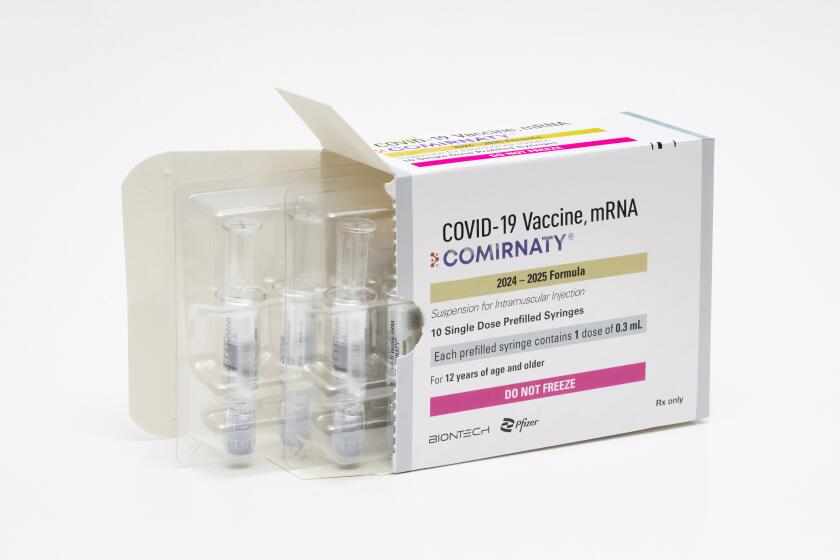OPTIMA Health Plan OK Awaited : Medicine: Agency today will select what approach it will take in creating Medi-Cal system.
Orange County today is expected to adopt a one-of-a kind system for providing health care to its 300,000 Medi-Cal recipients.
OPTIMA, the organization creating a new managed-care system for Medi-Cal patients in the county, is trying to curb Medi-Cal’s burgeoning cost in part by shifting indigents away from expensive hospital emergency rooms to an expanded pool of doctors close to their homes who can offer regular health care.
When directors of OPTIMA meet today to select a plan for the new system, they will have several options. But the agency’s consultant has given the highest marks to a plan that would allow the agency to contract with both existing health maintenance organizations and new alliances of independent doctors, clinics and hospitals.
Today’s decision will be “a major turning point in the development of the system,” said Samuel Roth, assistant director of the Orange County Medical Assn. “It will go a long way to determining how providers wishing to contract with OPTIMA will be required to organize themselves and with whom they will be required to organize.”
Orange County follows two other counties, Santa Barbara and San Mateo, which more than a decade ago assumed from the state the responsibility for providing Medi-Cal services. In addition, Solano County established its own Medi-Cal system in April and Santa Cruz County, like Orange County, will begin patient enrollment in July.
One of the early county-based Medi-Cal programs founded in Monterey County went bankrupt; state officials said it was the result of poor management, including overgenerous payment of hospitals and physicians.
But with an estimated 300,000 patients to serve and an annual budget of up to $600,000, OPTIMA will be the largest of its kind in the nation. Moreover, “OPTIMA will be the biggest health plan by far in Orange County, bigger than Kaiser,” said John R. Cochran III, chief executive officer of Martin Luther Hospital in Anaheim and OPTIMA’s board chairman.
Only a small number of Orange County physicians accept patients covered by Medi-Cal, which has been criticized for low reimbursement and red tape.
*
In demonstrating the urgency to improve access to health care in Orange County, OPTIMA consultant Cindy Johnson has said that only 50% of Medi-Cal recipients on Aid to Families with Dependent Children in the county receive any medical services in a given year, compared to about 85% on the East Coast.
Since OPTIMA was formed last year by the Orange County Board of Supervisors, many doctors and hospitals have been waiting to learn how they can participate in the new program.
Although the switch from fee-for-service to a prepaid managed health system is not expected to be any more lucrative for doctors and hospitals, the hope is that because OPTIMA will be administered locally, it will be more hassle-free and responsive to area needs than the state-administered Medi-Cal program.
“Many providers show support for anything that will alleviate the built-in denials and retroactive denials of the system driven out of Sacramento,” Roth said. “It is half the battle when you alleviate the hassle associated with trying to provide quality medical care.”
OPTIMA board members face four choices today, including one that would have all Medi-Cal patients enroll in health maintenance organizations or in the few physician groups that already have created a full range of integrated medical services.
Consultants have determined HMOs would save the state the most money because they have experience controlling the use of services and would not require OPTIMA to act as a gatekeeper to prevent excessive patient referrals to specialists and excessively long hospital stays.
But there is widespread fear, especially in Latino and Asian communities, that exclusive contracting with HMOs would squeeze out the independent physicians, clinics and pharmacies that traditionally have served neighborhoods.
“The greatest fear we have in the Asian community is that foreign-born doctors who currently are serving the Asian medical population will lose their clientele,” said Alan Woo, president of the Asian Pacific Health Alliance, a group of health-care advocates.
“Our physicians will not have a say within traditional HMOs, because that environment is western based with an Anglo philosophy that has traditionally discriminated against non-English-speaking doctors,” he said.
*
On Friday, OPTIMA’s Executive Director Mary Dewane was guided through Little Saigon’s clinics and pharmacies by Westminster Councilman Tony Lam, who said he wanted to show her that Vietnamese physicians are doing a fine job taking care of that population.
Lam said he wishes OPTIMA would model itself after the Medi-Cal plans of Santa Barbara and San Mateo, which will contract with solo practitioners and stand-alone clinics. This option is also before the OPTIMA board.
“The Vietnamese physicians and pharmacists don’t want to be sucked into a big company . . . with high overhead and bureaucracy,” Lam said. “I am an advocate of saving money for the state, but I don’t want the big companies to take advantage of and eat up the smaller ones.”
Concerns for self-preservation also have been expressed by the executive director of the Orange County Coalition of Community Clinics. Russell Inglish said he worries that if Medi-Cal patients and thus Medi-Cal funding is siphoned from the clinics, they may not be able to survive to care for the county’s poor who have no health insurance at all.
Ed Foley, executive vice president of the Hospital Council of Southern California and the head of its Orange County chapter, also said his organization wants to make certain the three hospitals in the county that have treated an exceptionally large number of Medi-Cal patients--UCI Medical Center, Children’s Hospital of Orange County and Doctors Hospital of Santa Ana--will not suffer significant losses of patients under OPTIMA.
It is generally agreed that traditional Medi-Cal providers should be retained in case OPTIMA fails.
“If it fails, we must make sure the safety net is still in place,” said Roth of the Orange County Medical Assn. “These are the people who stayed in the trenches for the last 20 years taking care of the medically indigent in Orange County when few others would.”
Addressing this concern, OPTIMA developed the “hybrid” plan, which would permit private physicians, clinics and hospitals to form consortiums as an alternative to joining HMOs. Like HMOs, these consortiums would be required to provide a wide range of specialty and ancillary services, possibly even including laboratory tests and X-rays, along with a system to guard against over-utilization and ensure quality of care.
Also, the consortiums would bear the full financial risk of providing care within the flat monthly rate that OPTIMA would pay them depending on the number, age and sex of the patients they enroll. But consortiums, unlike HMOs, would not have to go through the lengthy and expensive process of obtaining a state license.
“It is so unique that I don’t know of anyplace else in the country that is doing it,” Dewane said of the consortium approach. “It allows for greater access into the system and greater control on the part of traditional and solo practitioners than if they had to align with an existing HMO or fully integrated network.”
*
But Dr. Robert R. Beltran, an ear, nose and throat specialist in Costa Mesa, predicted independent physicians and hospitals will have difficulty forming consortiums by next spring when OPTIMA health care providers will be selected. Thus he predicts that HMOs will quickly corner the patient market.
“It is a slam-dunk situation for the HMOs,” Beltran said, voicing a fear also expressed by other physicians.
But Dewane, who in the past six weeks has visited 15 hospitals and met with more than 700 physicians to explain what OPTIMA is all about, strongly disagrees.
Cochran said that to allow physicians and hospitals to contract individually with OPTIMA would erode the advantages of having a kind of one-stop medical service that can put a patient in touch with any level of care that is needed. He said many physicians already have organized into groups capable of contracting with OPTIMA and many others are doing so.
“The dream the OPTIMA board has is that the providers will organize the system so patients don’t have to go hunting anymore,” Cochran said.



